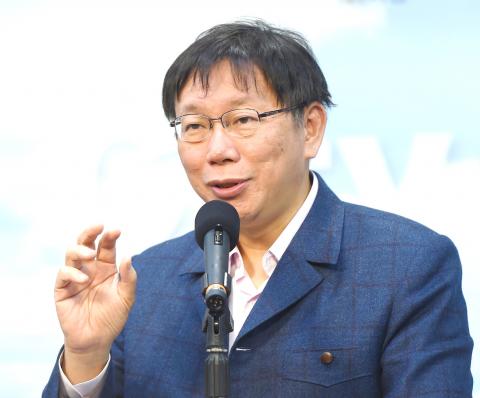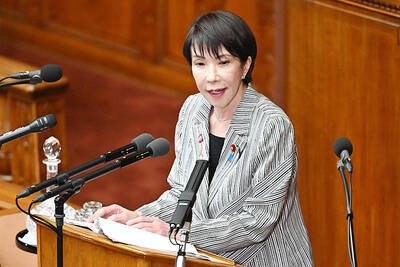Colonization is associated with progress in the Chinese-speaking world, Taipei Mayor Ko Wen-je (柯文哲) said in an interview published on Thursday on the Foreign Policy magazine Web site.
“For the [world’s] four Chinese-speaking regions — Taiwan, Singapore, Hong Kong and Mainland China — the longer the colonization, the more advanced a place is,” Ko said, adding that it was “embarrassing” that “Singapore is better than Hong Kong; Hong Kong is better than Taiwan; Taiwan is better than the mainland.”
Ko did not elaborate, but Taipei City Government spokesman Sidney Lin (林鶴明) said the mayor’s remarks were intended to highlight some of the positive influences of colonization, without denying the “historic scars” and “bad memories” left behind by colonizers.

Photo: Fan Pin-chao, Taipei Times
While the “open door” brought by colonization influenced colonized societies in a variety of ways, colonizers also left infrastructure and institutions that had an undeniably positive affect, Lin added.
In the interview, Ko reiterated comments that the “cultural gap” between Taiwan and China had to be closed before there could be any talk of “reunification.”
“When more than 99 percent of Chinese people close the doors while doing their business in bathrooms, we can talk about reunification [sic],” he said.
On cross-strait relations, he said: “Cooperation is more important than reunification,” while speaking of a need to convince China that “a free and democratic Taiwan is more in China’s interest than reunification.”
“People talked about ‘one country, two systems,’ but maybe we should talk about ‘two countries, one system’ instead,” he said.
Ko’s celebrity and status as an independent politician have led to hopes that he might be able serve as a bridge between the Democratic Progressive Party (DPP) and China through his participation in the annual Taipei-Shanghai forum.
Whether his proposal for a “two countries, one system” formula would have a bearing on cross-strait relations is unknown.
Late last night, Lin said that Ko has an open attitude toward cross-strait city-to-city exchanges and upholds the principles that both sides should know, understand and respect each other while cooperating.
In response to Ko’s proposal last week that the forum include other cities, Shanghai Mayor Yang Xiong (楊雄) said that further exchanges were welcome “on the foundation of the 1992 consensus.”
While China insists that the so-called “1992 consensus” of “one China with different interpretations” must be the premise of any cross-strait talks, Ko said in December last year that the slogan was a 22 year-old “consensus without consensus,” which should be replaced by what he termed a “2015 consensus.”
He declined to define what such a consensus might be.
“Without taking any position on the 1992 consensus, it is impossible to expect Shanghai to cooperate,” National Taiwan University associate professor of political science Chang Teng-chi (張登及) said. “The original hope was that there might be a possibility for Ko as an independent to have a greater flexibility to reinterpret the 1992 consensus by reiterating some part of it without ‘recognizing’ or ‘totally denying it.’”
Major questions remain over the role Ko might be able to play, he said, adding Ko will face major hurdles due the necessities of managing the city government as well as his lack of understanding of the “very detailed and subtle” aspects of the cross-straits relationship.
Asked about Ko’s colonization remarks, National Chengchi University Taiwanese History department professor Hsueh Hua-yuan (薛化元) said that imperialism in contemporary history often brought about systems and construction that are later utilized by the former colony.
It is hard to deny that colonists affected their former colonies and brought about the modernization of colonized areas, Hsueh said.
National Taipei University Department of Administration and Policy professor Hao Pei-chih (郝培芝) said that the comments reflect Ko’s experience and views that being law-abiding represents advancement.
What is left for the former colony depends largely on the colonizer, Hao said, referring to how most former French colonies remain less developed, while those of England and Japan were more developed.
This story has been updated since it was first published.
Additional reporting by Tseng Wei-chen and Jake Chung, staff reporter with staff writer

Taiwan’s exports soared to an all-time high of US$61.8 billion last month, surging 49.7 percent from a year earlier, as the global frenzy for artificial intelligence (AI) applications and new consumer electronics powered shipments of high-tech goods, the Ministry of Finance said yesterday. It was the first time exports had exceeded the US$60 billion mark, fueled by the global boom in AI development that has significantly boosted Taiwanese companies across the international supply chain, Department of Statistics Director-General Beatrice Tsai (蔡美娜) told a media briefing. “There is a consensus among major AI players that the upcycle is still in its early stage,”

‘SECRETS’: While saying China would not attack during his presidency, Donald Trump declined to say how Washington would respond if Beijing were to take military action US President Donald Trump said that China would not take military action against Taiwan while he is president, as the Chinese leaders “know the consequences.” Trump made the statement during an interview on CBS’ 60 Minutes program that aired on Sunday, a few days after his meeting with Chinese President Xi Jinping (習近平) in South Korea. “He [Xi] has openly said, and his people have openly said at meetings, ‘we would never do anything while President Trump is president,’ because they know the consequences,” Trump said in the interview. However, he repeatedly declined to say exactly how Washington would respond in

Japanese Prime Minister Sanae Takaichi said yesterday that China using armed force against Taiwan could constitute a "survival-threatening situation" for Japan, allowing the country to mobilize the Japanese armed forces under its security laws. Takaichi made the remarks during a parliamentary session yesterday while responding to a question about whether a "Taiwan contingency" involving a Chinese naval blockade would qualify as a "survival-threatening situation" for Japan, according to a report by Japan’s Asahi Shimbun. "If warships are used and other armed actions are involved, I believe this could constitute a survival- threatening

WARFARE: All sectors of society should recognize, unite, and collectively resist and condemn Beijing’s cross-border suppression, MAC Minister Chiu Chui-cheng said The number of Taiwanese detained because of legal affairs by Chinese authorities has tripled this year, as Beijing intensified its intimidation and division of Taiwanese by combining lawfare and cognitive warfare, the Mainland Affairs Council (MAC) said yesterday. MAC Minister Chiu Chui-cheng (邱垂正) made the statement in response to questions by Democratic Progressive Party (DPP) Legislator Puma Shen (沈柏洋) about the government’s response to counter Chinese public opinion warfare, lawfare and psychological warfare. Shen said he is also being investigated by China for promoting “Taiwanese independence.” He was referring to a report published on Tuesday last week by China’s state-run Xinhua news agency,